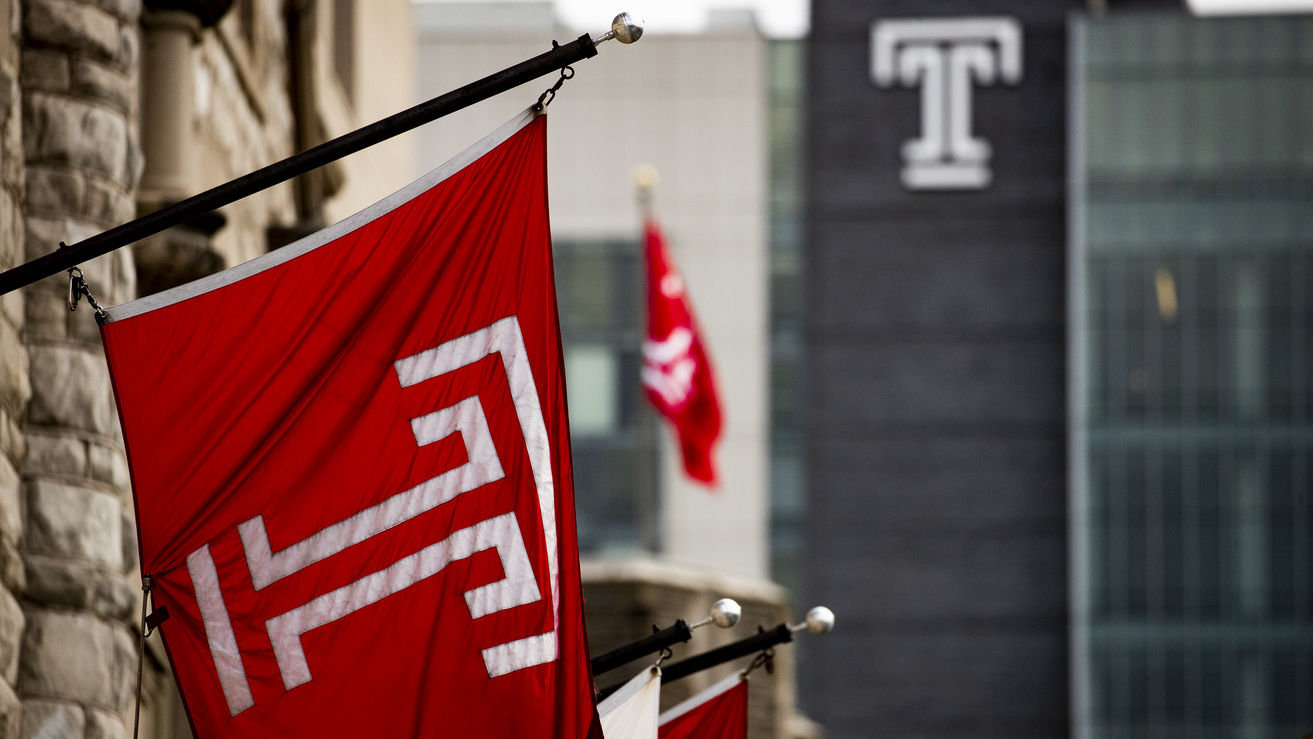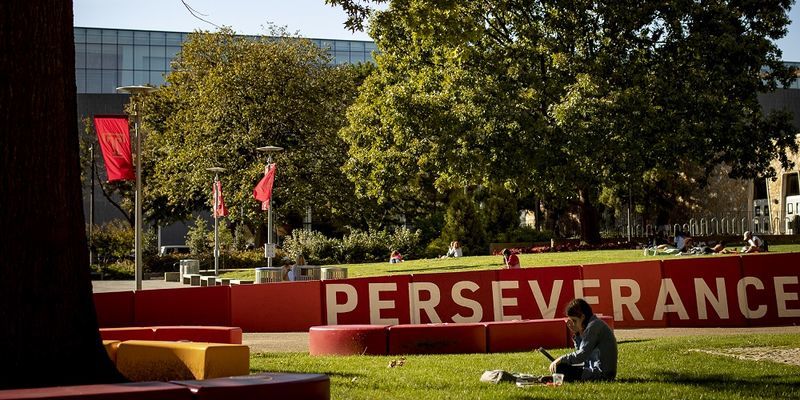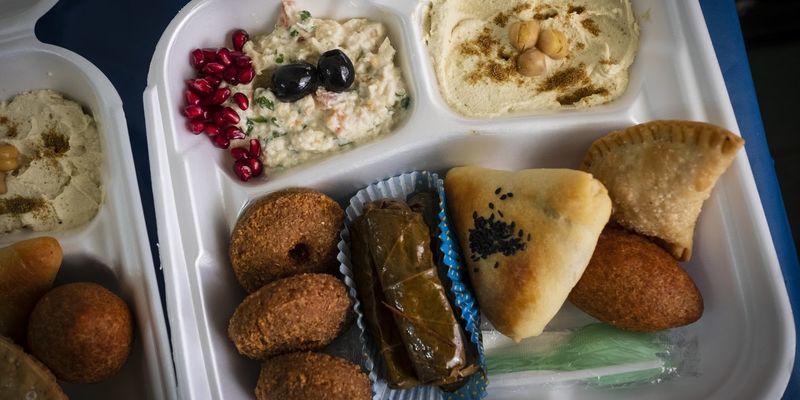For North Philadelphia students, the Cecil B. Moore Scholars Program bridges the gap between high school and college
The scholars program creates a path to attending college for students living in the neighborhoods closest to Temple.

For many students, the transition from high school to college isn’t easy. The application process can be daunting and once you’ve started as a first-year student, learning to handle the workload and navigate your way through a new environment can be equally tough. For students coming from underserved or under-resourced schools, the process can be even harder.
That’s where the Cecil B. Moore Scholars Program comes in. Developed by Temple and educational nonprofit Steppingstone Scholars—and named after the Temple alumnus and civil rights activist—the program creates an academic pathway to college for high school students in North Philadelphia, providing tutoring, mentorship and the opportunity to take a free course at Temple during their senior year of high school.
The first 25 scholars were recently chosen from a group of around 30 finalists and will move into the next phase of the program, receiving full tuition scholarships that will cover all four of their years at Temple.
The program was inspired by a desire to make Temple more accessible to the students who live closest to Main Campus. “There are a number of folks across the university that had a burning interest in doing more for the students in our backyard and cultivating more of a college-going culture in North Philadelphia,” said Shawn Abbott, vice provost for admissions, financial aid and enrollment management. The university hoped students would “not just see Temple as a viable destination, but also see this program as a way to come to Temple with the kind of financial resources and the student support services that might be needed.”
Steppingstone Scholars, which works with Temple on other initiatives, has been helping students in Philadelphia for more than two decades and was eager to collaborate on the scholars program. “We have this deep pipeline of work and all of it is focused on getting kids into college and the workforce,” said the nonprofit’s president, Sean Vereen. “We think this is an innovative partnership because we’re not just a nonprofit that’s got a space at a university, we’re co-running programs as well.”
A major part of the scholars program is the dual enrollment course, in which students take a three-credit General Education class that counts toward their Temple degree. The classes are broadly based and tackle social or cultural issues. “They’re meant to be courses that have a wide scope,” said Daniel Berman, vice provost for undergraduate studies. “They’re a good choice for a high school student who’s getting a taste of a college course.”
Dual enrollment also gives students a feel for what life at college will be like. “Because it’s only one course, you get a sneak peek into what it feels like to balance college coursework with all your other responsibilities, before you take that full course load in the fall,” said Paris Williams, the program’s director.
And the classes serve as a perfect introduction to Temple as well. “We wanted an opportunity to convince these students to come to Temple,” Abbott said. “These are students who have qualified for admission, but we fully recognize that they are likely qualifying for admission at other colleges and universities and we wanted an opportunity to show them that Temple is where they should choose to spend the next four years.”
Anyae Scott, a high school senior and Cecil B. Moore Scholars Program finalist, first heard about the program through Temple Upward Bound, another Temple and Steppingstone Scholars partnership that supports low-income students. She applied because she has always felt comfortable at the university. “Temple is close to home. I’ve been on the campus a lot and I never feel out of place,” she said.
Her dual enrollment course looks at higher education itself. “I chose my course because growing up, I always heard people talking about college and whether it’s really important or not and I wanted to form an opinion on my own,” she said. “I’m still evolving, but I think college is important, especially for the career goals that I’m interested in.”
Frida Perez, also a senior, applied because Temple is close to home. “It’s right in my area,” she said. “I like being close to my family. They are a daily reminder of why I’m going to college and why I chose the career that I chose: healthcare, because I’d like to look out for and help people.” Dual enrollment has helped her adjust to a college environment. “It’s made me feel comfortable enough to share my opinions and know they’re not going to be judged, because everybody’s there to help one another,” she said.
The scholars program is especially important now, as students from underserved school districts face more challenges entering higher education than ever before. Pennsylvania is the fourth-most expensive state to go to college in, Vereen said. Many students in North Philadelphia are either the first members of their families to attend college or the first who will graduate. “The proportion of the population in North Philadelphia that has actually attended college is one of the lowest amid different sections of the city,” Vereen said.
Math and writing skills can be another hurdle. Students who struggle with either in their first year have a much higher rate of dropping out, repeating courses or not graduating on time, Berman said. The scholars program specifically includes math and writing support as a part of the summer bridge experience to help address this.
“If we’re going to make this commitment [i.e., the scholars program], we’ve got to make a commitment for the students to be able to finish,” Vereen said, “which means giving them the scholarship that works across their four years at Temple and also having the support in place to make sure that they are successful.”
Crucially, the program is also designed to help students bond around the Temple experience and feel at home. “If you look at the literature around student success,” Berman said, “it’s true that students who have a stronger sense of belonging and feeling of identity connected to the institution tend to persist. They tend to do better and they tend to stick around.”
Since the university began recruiting students last October, the response to the program from high school counselors and other members of the community has been positive. “I think people are excited to hear about this opportunity at Temple,” said Alyssa Liles-Amponsah, associate director of diversity initiatives and community relations at Temple’s undergraduate admissions office. “It’s an opportunity that makes sense, for the students who live closest to the university to come and contribute their wisdom and knowledge to the university that serves their community.”
For the students themselves, the program has been invaluable. “A lot of people come into college and they think it’s going to be the same [as high school],” said Khyrah Blue, a Cecil B. Moore Scholars finalist. “From experience, I can tell that it’s not.”
She appreciates having so many people around her—including student mentors, tutors and Williams—who want her to succeed. “They give me advice, they help me with work, they make sure I’m doing all right in the [dual enrollment] class. And we have checked in study halls [where a student’s attendance is monitored] and personal meetings,” Blue said. “Having a program coach is amazing to me.”
Williams hopes the program will help students spread their wings. “I’m a Temple alumna and the university has helped me grow and develop as a professional and as a student,” she said. “I’m really excited for other students to be able to experience that.”
The scholars program not only reflects Temple’s commitment to North Philadelphia students, but also its appreciation for what they can bring to the university. It “sends a powerful message to the community that we value these students,” Liles-Amponsah said, and “while we think Temple is wonderful, we know it is even more so when more voices and more perspectives are included.”
Berman agrees. “It’s really important that we show the communities around us that we really do welcome them,” he said. “It’s that open door to our neighbors. That is really what makes this program special.”
—Edirin Oputu


